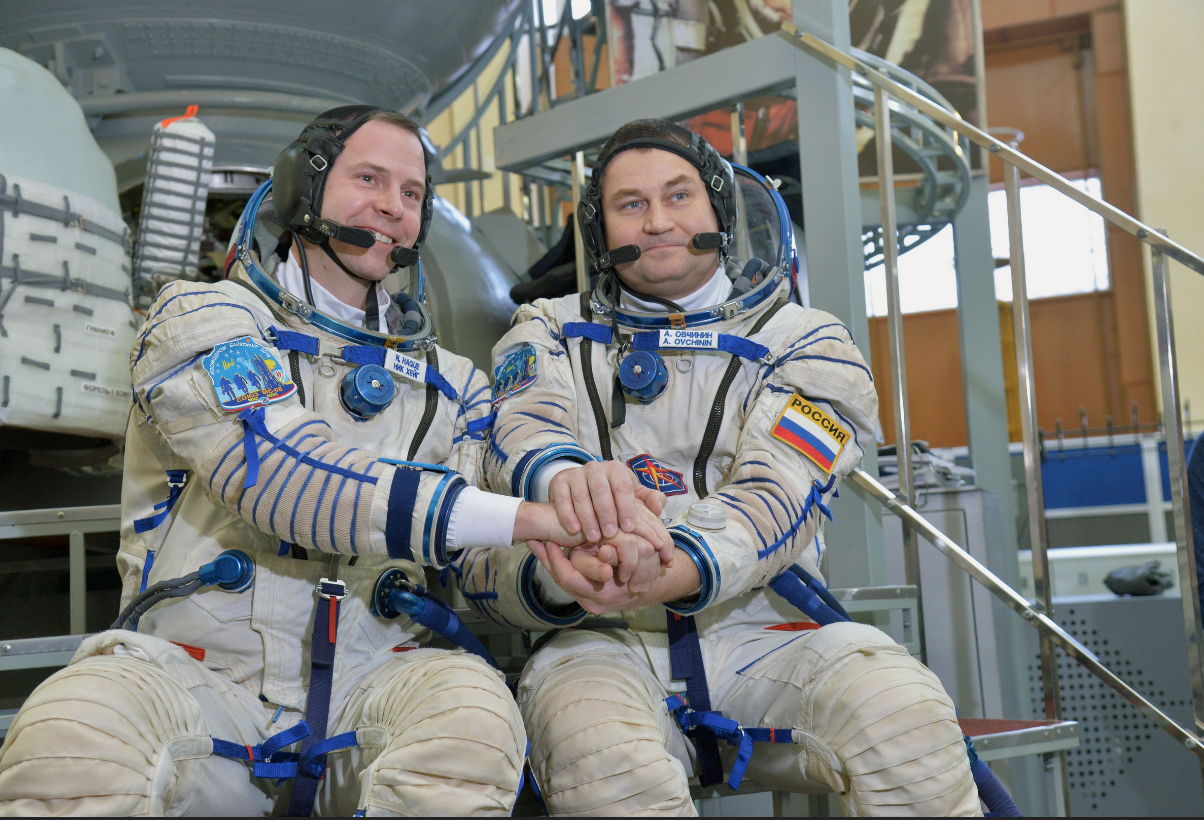
At the Gagarin Cosmonaut Training Center in Star City, Russia, Expedition 55 backup crew members Nick Hague of NASA (left) and Alexey Ovchinin of Roscosmos (right) pose for pictures during a day of qualification exams Feb. 20. They will launch aboard a Soyuz spacecraft for a six-month mission to the International Space Station on Oct. 11, 2018.Col. Nick Hague (left) and fellow crew menter cosmonaut Alexey Ovchinin will launch aboard a Soyuz spacecraft for a six-month mission to the International Space Station on Oct. 11, 2018. NASA photo by Elizabeth Weissinger
As a first-time astronaut, Air Force Col. Nick Hague expects to face a steady stream of new experiences.
Hague, who was selected to be an astronaut in 2013 and completed his astronaut candidate training in 2015, is set to launch to the International Space Station on a Soyuz spacecraft commanded by Russian cosmonaut Alexey Ovchinin on Oct. 11 from the Baikonur Cosmodrome in Kazakhstan. He will be in space for six months, through April 15, as a flight engineer.
“It’s my first mission, so everything’s going to be new,” he told Air Force Magazine in a Friday interview.
“All the little things that are going to be first, that pop up, that are unexpected, I think that’s going to be the exciting part of it because every day there’s going to be some new discovery that I’m making on a personal level that everybody that’s come before me has discovered already,” he said.
For one thing, he said, he has spent a lot of time training to do a spacewalk and will find it “fulfilling” to do it in orbit.
Hague, who holds a bachelor’s degree in astronautical engineering from the US Air Force Academy and a master’s degree in aeronautical and astronautical engineering from the Massachusetts Institute of Technology, will take part in a number of experiments planned for his stay in space.
The crew is set to participate in about 250 research investigations and technology demonstrations, including, “a couple dozen different experiments up there where I’m the guinea pig,” he said.
“They’ve been testing me for the last six months before I launch, they’re going to test me while I’m on orbit, and then they’re gong to test me for upwards of a year after I land to see what kind of changes space had on my body.”
There are studies he is doing, he added, “that are looking at how your mind changes, because you always use gravity to determine where your local vertical is” and which way is down, “so once you get on orbit, looking at how your mind changes to be able to navigate three-dimensional space and what long-term effect that may have, if any, that’s another study that I’m working on.”
While in space he’ll be able to stay in touch with his family— wife Air Force Lt. Col. Catie Hague and their two young sons, he said.
In addition to being able to make internet-protocol phone calls from space, NASA will have weekly video teleconferences, “so I’ll have a handful of minutes where I can do a Facetime/Skype-type video teleconference with the boys on the ground and with Catie,” he said.
His wife and sons will also have an allotment on cargo vehicles “so they can send up little surprises to me.”
“I think, more importantly for the boys, they can send something to me and then in a video teleconference, they can see that thing with me and then it connects them so that they know that they can have an impact on me.”